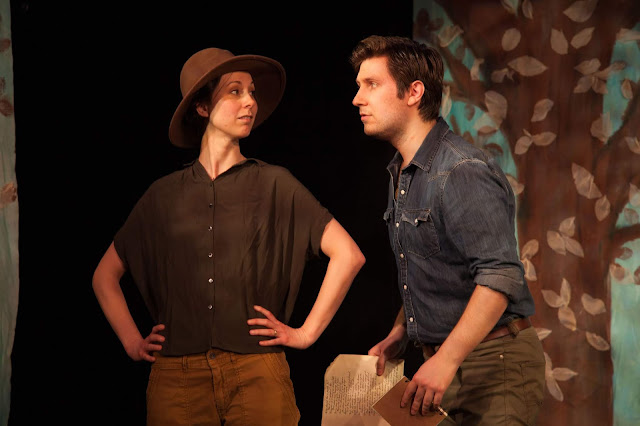Exploring Generational Trauma in 36 JUNIPER
 |
| Brendan Byrne as Theo in Wrong House's production of 36 Juniper. Photo courtesy of AK47 Division. |
Wrong House Productions is a vibrant and polished new theatre company in New York City, whose latest offering, 36 Juniper, sets out to examine the trauma and fallout from violence that run through the experience of the millennial generation.
Written by the founding members of Wrong House, several of whom double up as featured leads in the ensemble cast, 36 Juniper plays like part Agatha Christie, part Pinter, part Sartre: as five high school friends, and one newcomer, assemble to celebrate - or mourn - the anniversary of a school shooting 10 years ago.
The production is beautifully staged and performed. Director Greg Pragel (last seen fight directing for Hamlet Isn't Dead's Julius Caesar, and starring in Austin Pendleton's Richard III) knows how to stage a show, giving the actors space to find their own rhythms that suit the realism of the setting. Steven Brenman & Co's set is a detailed work of art, transforming a difficult L-shaped space into a full living room, while sound designer Alex Duncker manages to create a growing snowstorm and desperate soundtrack that feel in-world rather than something blaring from speakers. Zach Weeks' light design is particularly striking once all the lights go out, thanks to the impending blizzard, and the stage is left with only flashlights and a dark blue glow.
The acting is uniformly good. Brendan Byrne anchors the ensemble as Theo, whose brother it turns out was the killer on that fateful day. He undercuts his boyish good looks with real pathos and a wry sense of humor, mixing fury and pain in equal measure. Shannon McInally delights as Amy, the heart of the group who has long harbored a crush on Theo, especially now that her own marriage is falling apart. Managing to subvert the manic pixie dream girl trope, McInally plays a grounded, yet still doggedly optimistic woman, that's a pleasure to see on the stage. Joe Reece as Tom is the "Barney" (from How I Met Your Mother) of the group: a guy who's ready to exit as soon as he enters; a man who can't seem to read the room, and yet is desperately searching for someone to hold onto. As his girlfriend, Mackenzie, Jessika McQueen also plays against stereotypes: proving that the seeming socialite might have more to offer than just tips on the best perfumes to buy. As the storm continues, and her facade fades away, a genuine woman is revealed underneath - elegant beneath borrowed sweatpants. Cousins Ben and Bobbi, played by Jacob Dabby and Alyssa Abraham respectively, gave some of my favorite performances of the night. Dabby was a force of barely contained fury, a man who smokes both physically and metaphorically. While Abraham dug deep to present a woman in the grip of addiction: sarcastic and earnest by turns as she grapples with a world that's become too much for her to deal with.
The script, devised among the company's founding members (Jack Creaghan, Jessika McQueen, Shannon McInally and Alyssa Abraham), was a solid piece of work that garnered a standing ovation and generated thoughtful discussion afterwards. Dealing with the fallout from trauma, particularly a school shooting, can veer perilously into after school special territory: a danger that the company managed to avoid. And certainly the tension mounted as the six party guests found themselves trapped together, and secrets inevitably came out. However, I found myself wanting more than just snippets of "what it was like on that day" from the characters. I wanted conflicting stories. I wanted details. Perhaps it's because I was an educator - not a child being educated - during those first few years after Columbine that my perspective on school shootings is less reactive than active; less traumatized than strategic. Therefore, as this play continues to be developed - which it should - I would suggest for those of other generations, there is some good in textually guiding the audience through what caused the trauma. I also found myself at the end of the play left without much hope of a way through trauma, or even a point towards the means of resolution. That may be the intent of the show: to give the audience the experience of being triggered, without a way out. Or it may be that the authors, being only part-way into their lives, simply don't have a way out themselves yet, except by that old art: catharsis. Similarly, I would encourage the female company members to write themselves even bolder roles for their next foray. Abraham was sidelined for most of the second act, McQueen didn't appear until half-way through the first act, and McInally's first defining characteristic was about a man. While the play more than passes the Bechdel Test (hooray!), these women are excellent performers and I can't wait for them to write even more central roles for themselves.
Wrong House is definitely a company to keep an eye on. With high production values, a stellar resident company, and something to say, Wrong House Productions is doing something right.


Comments
Post a Comment